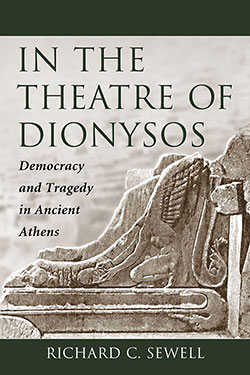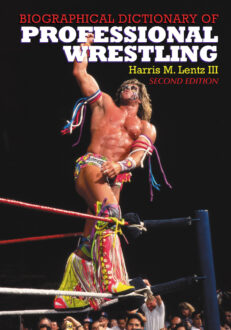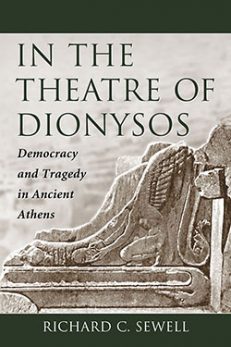In the Theatre of Dionysos
Democracy and Tragedy in Ancient Athens
$29.95
In stock
About the Book
Ancient Athens was unique in its politics, extraordinary in its religion and fanatic about its poetry. Yet its creativity peaked in a time of prolonged, avoidable and catastrophic war; the brilliance of Greek tragedy blazed while the people who made it were bringing ruinous defeat upon themselves.
This book describes the parallel lives of Athenian democracy and Athenian tragedy—how and why they concurrently arose, blossomed and died, shaped especially by a fatal Athenian penchant for war. The author, an actor visiting the Theater of Dionysos at Athens (where the Greek tragedies premiered), considers what hints time has left us of the life and death of Greek tragedy and of the three tragedians (Aeschylus, Sophocles and Euripides) some few of whose plays survive. He demonstrates how drama emerged from a fusion of four unique elements in Greek culture: bardic poetry; open sporting competition; uncodified religion; and exploratory philosophy. With glimpses of the authors, backers, performers and audiences who collectively created that astounding body of work, the book imagines the evolution of the tragic genre from a practitioner’s viewpoint.
About the Author(s)
Bibliographic Details
Richard C. Sewell
Format: softcover (6 x 9)
Pages: 216
Bibliographic Info: bibliography, index
Copyright Date: 2007
pISBN: 978-0-7864-2993-6
Imprint: McFarland
Table of Contents
Introduction: An Amateur Time-Travel Memoir 1
I. In the Theater of Dionysos
An Actor at Play with the Past—Athens, 2005 5
Three or More Greeces 11
A Braid of Three Strands 14
Arion 17
A Thespian’s Dionysia 21
II. Aeschylus and War News
Arms and the Man and the News 31
… and the New 37
How This Theater Worked—the Early Years 44
III. First Plays and Other Newness
Philosopher as Playwright 60
Suppliants, Persians and Seven 68
IV. Prometheus, Then Orestes
Forethought 82
The Cry on the House of Atreus 93
A Son Comes Home 101
The Gods Come to Athens 106
Afterthoughts 115
V. Sophocles and Euripides—Worse War News
An Unpleasant Few Minutes 121
Theater Life after Aeschylus 124
Of Ajax and of Heracles’ Wife 128
A One against a Many 134
Problematics 141
Two Electras, Sophocles’ and Euripides’ 146
VI. Then and Now
A Twinge 171
Hubris in a Theater of War 175
The Art of Old Age 180
Charon’s Steps 183
Then Afterthought Said 188
Bibliography 195
Index 199
Book Reviews & Awards
“Reading [this book] is like sitting down to a leisurely, open-ended chat—probably over a glass or two of scotch—with one of those passionate, marvelously well-informed, creative and freewheeling thinkers who manages also to be charming. There are insights here that I can’t wait to put to use in my next directing project, and enthusiasm here that rejuvenates the reader for the daily business of living a good life and/or doing good theatre.”—Shepard Sobel, Artistic Director, The Pearl Theatre Company, Inc.





